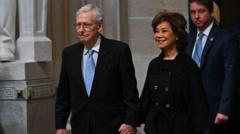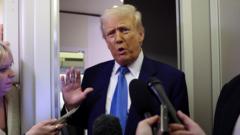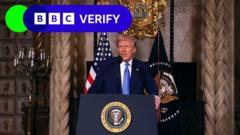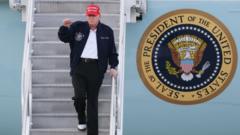As international negotiators convene in Paris and Riyadh this week, the urgency surrounding the Ukraine conflict has escalated. European leaders are in Paris to formulate a unified response following Donald Trump's unexpected proposal for negotiations with Vladimir Putin, aimed at ceasing hostilities. Concurrently, a significant meeting between Russian Foreign Minister Sergei Lavrov and U.S. Secretary of State Marco Rubio is set in Saudi Arabia.
**Key Stakeholders' Perspectives on Ukraine Peace Talks Amidst Intensified Diplomacy**
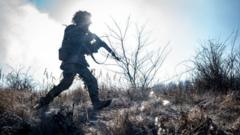
**Key Stakeholders' Perspectives on Ukraine Peace Talks Amidst Intensified Diplomacy**
With crucial diplomatic talks scheduled in Paris and Riyadh, key players are eager to articulate their goals and concerns.
### Summary
This week, leaders from various nations, including the UK, Germany, Poland, and France, are gathering for high-stakes talks regarding the ongoing war in Ukraine, reflecting divergent national interests amid shifting U.S. foreign policy, with Ukraine notably absent from the negotiations.
In Paris, UK leader Sir Keir Starmer seeks to act as a mediator between European counterparts and the new U.S. administration, which has tempered previous stances advocating for Ukraine's territorial integrity. Starmer's proposal to deploy UK troops aims to prevent further Russian aggression while the ongoing debate in Parliament reflects concerns about national defense spending. German Chancellor Olaf Scholz’s presence in Paris underlines the unease in Berlin towards a potential settlement that undermines Ukrainian sovereignty, especially in light of a national election looming. Germany remains committed to supporting Ukraine, conscious of the historical risks of appeasement.
On the eastern front, Poland stands firm on its support for Ukraine, viewing Russian victory as a direct threat to European security. Polish Prime Minister Donald Tusk's warnings emphasize the need for increased defense funding across Europe as negotiations unfold.
The Nordic and Baltic countries, represented by Denmark, remain concerned about security implications for nations bordering Russia, with discussions on potential peacekeeping forces lingering in deliberations. France, amid anxiety over American geopolitical strategies, has called for collective European responses, with President Emmanuel Macron laying the groundwork for enhanced coordination among allies.
In tandem, a second set of talks in Saudi Arabia pits the U.S. against Russia, with Lavrov primarily seeking recognition of occupied territories and reversal of sanctions—a demand met with resistance by most European nations. The U.S., influenced by Trump's administration, appears more amenable to compromises, stirring concern among European allies regarding Ukraine's fate absent its direct representation in these negotiations. Ukraine, for its part, expresses deep skepticism about talks conducted without its involvement, stressing the importance of its sovereignty and future.
As both diplomatic efforts progress, the atmosphere remains fraught with uncertainty, and the outcomes of these discussions may significantly impact the trajectory of the conflict and the security landscape in Europe.
This week, leaders from various nations, including the UK, Germany, Poland, and France, are gathering for high-stakes talks regarding the ongoing war in Ukraine, reflecting divergent national interests amid shifting U.S. foreign policy, with Ukraine notably absent from the negotiations.
In Paris, UK leader Sir Keir Starmer seeks to act as a mediator between European counterparts and the new U.S. administration, which has tempered previous stances advocating for Ukraine's territorial integrity. Starmer's proposal to deploy UK troops aims to prevent further Russian aggression while the ongoing debate in Parliament reflects concerns about national defense spending. German Chancellor Olaf Scholz’s presence in Paris underlines the unease in Berlin towards a potential settlement that undermines Ukrainian sovereignty, especially in light of a national election looming. Germany remains committed to supporting Ukraine, conscious of the historical risks of appeasement.
On the eastern front, Poland stands firm on its support for Ukraine, viewing Russian victory as a direct threat to European security. Polish Prime Minister Donald Tusk's warnings emphasize the need for increased defense funding across Europe as negotiations unfold.
The Nordic and Baltic countries, represented by Denmark, remain concerned about security implications for nations bordering Russia, with discussions on potential peacekeeping forces lingering in deliberations. France, amid anxiety over American geopolitical strategies, has called for collective European responses, with President Emmanuel Macron laying the groundwork for enhanced coordination among allies.
In tandem, a second set of talks in Saudi Arabia pits the U.S. against Russia, with Lavrov primarily seeking recognition of occupied territories and reversal of sanctions—a demand met with resistance by most European nations. The U.S., influenced by Trump's administration, appears more amenable to compromises, stirring concern among European allies regarding Ukraine's fate absent its direct representation in these negotiations. Ukraine, for its part, expresses deep skepticism about talks conducted without its involvement, stressing the importance of its sovereignty and future.
As both diplomatic efforts progress, the atmosphere remains fraught with uncertainty, and the outcomes of these discussions may significantly impact the trajectory of the conflict and the security landscape in Europe.


